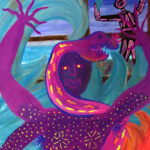
In this episode, Stewart Cubley explores what completing a painting really means — how to recognize when your painting is finished, without abandoning or overdoing.
An excerpt from Completion . . .
One of the most interesting aspects of the creative painting process has to do with completing a painting. How do you know when you’re done? When is the painting over? This appears to be rather arbitrary in a lot of cases: Well, I feel like I’m finished, there’s nothing else to do. Or sometimes people say: “It’s balanced, I kind of like the way this color goes with this color — or maybe, I’ve made my statement, I’ve said what I want to say.” If a person is open to discussion, I’ll probably question whether or not they’re actually finished at this point, because completing a painting happens in a very different way than we suspect.
Everything that’s natural in life has a beginning, a middle and an end — there’s a cycle of completion. Everything has a natural rhythm and timing that we have tend to terminate before it’s actually lived out its full life. We’re tempted to stop before were finished; we want to be done; we want to move on to the next painting, to take another piece of paper. This is a moment of challenge in process painting — to determine when you’re actually finished or when are you’re prematurely truncating the experience. And there’s a reason that we’re tempted to abandon our efforts prematurely. It’s because to really complete a painting we have to get out of our own way. We have to go beyond the reach of our own self-control, we have to escape the mindset of “pretty and balanced and profound.”
The real completion of a painting comes from a very different place. It’s not something that we decide; it’s more a recognition, usually happening once you’re already there. I often say, “You can’t know when you’re finished.” What I mean by that is you can’t know ahead of time, you can’t say, “Okay I’m going to do this and this and this and then I’ll be finished.” You can’t say, “I just have to complete this part of it and then I’ll be done.” Because the truth is you don’t know. You may complete those things, but then there could be another inkling. There could be a new call. This requires an intimacy with the creative muse — being willing to stay open, to be vulnerable, to not know when you’re finished. This requires a high degree of wakefulness.
Listen to learn more!
